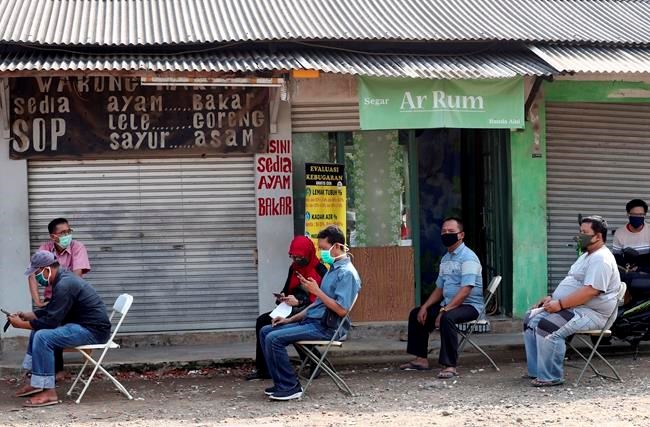JAKARTA, Indonesia — The number of coronavirus cases in Indonesia surpassed 50,000 on Thursday, an increase that is worrying experts at a time when the government is allowing businesses to reopen amid increasing economic pressure.
The surging cases in the world’s fourth-most populous country align with its increasing testing capacity, which has averaged close to the government’s daily target of 20,000 over the past week, said Achmad Yurianto, spokesman for the National COVID-19 Task Force.
But skepticism remains over the ability of the government to conduct enough tests to determine the true spread of the virus in the Southeast Asian nation, home to more than 270 million people living on thousands of islands.
The task force said the coronavirus has infected 50,187 people and killed at least 2,620, the highest number of cases and fatalities in Southeast Asia. That's up from just two positive cases in early March.
A total of 20,449 patients have recovered from the illness nationwide.
Since the first cases were confirmed, Indonesia has tested fewer than 430,000 people, according to government data.
That’s far from the World Health Organization’s recommendation of testing 1% to 1.5% of a country’s population, said Laura Navika Yamani, an epidemiology expert at Airlangga University.
“In terms of epidemiological measures, the situation in Indonesia is indeed not safe,” Yamani said. “Without sufficient testing, the full extent of COVID-19 transmission will remain unknown.”
The soaring number of cases is deepening Indonesia's economic gloom.
Planning Minister Suharso Monoarfa recently said that up to 5.5 million Indonesians may lose their jobs because of the pandemic.
Already, 9.4% of the population lived below the national poverty line last year. He said the poverty rate is expected to rise to 10.2%.
President Joko Widodo said his administration wants Indonesia’s economy back on track but safe from the virus, and started the country’s reopening earlier this month.
Offices, restaurants and shopping
Many people are worried about the reopening. The government plans to enforce health rules by deploying 340,000 security personnel as the restrictions are gradually lifted through July.
Working at a private hospital in Jakarta, Dr. Yesika Nadya contracted the virus while treating a patient who was seriously ill with COVID-19.
She said there used to be a shared desire to curb coronavirus transmission, but now things have changed with the focus now on reopening, with people more concerned about making money for food instead of observing health guidelines.
“I am worried because this impact can harm a wider community and for some people it can cause serious illness,” she said.
Indonesia’s economy grew just 2.9% in January-March, its slowest rate in almost two decades, as the pandemic made its effects felt.
Forecasts are more grim. The World Bank expects no growth for Indonesia this year, while the Asian Development Bank projected Indonesia’s gross domestic product will shrink 1% this year, its worst performance since the 1998 Asian financial crisis.
On June 16 the government unveiled a third stimulus package worth 695.2 trillion rupiah ($49.6 billion), following previous ones
“We are hoping that this stimulus can maintain our economic growth at above zero
Health experts have warned that Indonesia's fight against COVID-19 is far from over, emphasizing that its limited testing capabilities make it harder to obtain an accurate picture of the pandemic, and saying that reopening the economy prematurely could trigger a second wave of infections.
“The goal is yet to be reached,” said Yamani, the epidemiologist. “The number of (confirmed) COVID-19 cases in Indonesia is just the tip of the iceberg of an outbreak with those low testing rates.”
Niniek Karmini And Edna Tarigan, The Associated Press


